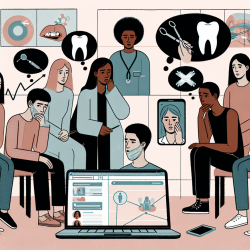Introduction
As practitioners dedicated to improving children's outcomes, it is crucial to expand our understanding of healthcare disparities, especially among indigenous populations. The research article titled "Ongoing challenges in access to diabetes care among the indigenous population: perspectives of individuals living in rural Guatemala" provides valuable insights into the healthcare challenges faced by indigenous communities. This blog aims to inspire practitioners to implement research findings and encourage further exploration to enhance healthcare delivery for marginalized groups.
Understanding the Challenges
The study highlights the disproportionate impact of type 2 diabetes on indigenous communities in Guatemala, with a prevalence rate of 25% compared to the national average of 9.3%. This disparity is attributed to factors such as mistreatment by healthcare providers, mental health comorbidities, and medication affordability, all influenced by indigeneity, poverty, and gender.
Implementing Research Findings
Practitioners can take several steps to address these challenges and improve healthcare outcomes for indigenous communities:
- Build Trust: Establishing trust between healthcare providers and indigenous patients is crucial. Practitioners should engage in culturally sensitive communication, respect traditional healing practices, and involve community leaders in healthcare planning.
- Address Mental Health: Recognize the mental health comorbidities associated with diabetes and provide integrated care that includes mental health support. Tailored interventions can help mitigate the psychological impact of chronic diseases.
- Ensure Medication Access: Advocate for policies that improve the availability and affordability of medications. Collaborate with local governments and NGOs to establish reliable supply chains and reduce financial barriers for patients.
Encouraging Further Research
While the study provides valuable insights, there is a need for further research to deepen our understanding of healthcare disparities among indigenous populations. Practitioners are encouraged to explore the following areas:
- Cultural Competency: Investigate how cultural beliefs and practices influence healthcare-seeking behavior and treatment adherence among indigenous communities.
- Social Determinants of Health: Examine the impact of social, economic, and political factors on health outcomes and access to care for indigenous populations.
- Intervention Effectiveness: Evaluate the effectiveness of culturally tailored interventions and community-based programs in improving health outcomes and reducing disparities.
Conclusion
By implementing the research findings and encouraging further exploration, practitioners can contribute to reducing healthcare disparities and improving outcomes for indigenous communities. Together, we can empower change and create a more equitable healthcare system for all.
To read the original research paper, please follow this link: Ongoing challenges in access to diabetes care among the indigenous population: perspectives of individuals living in rural Guatemala.










